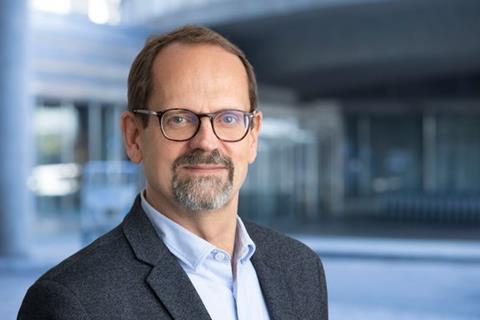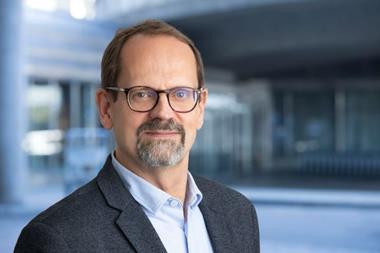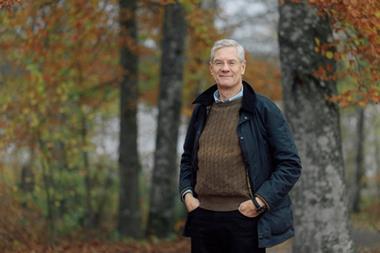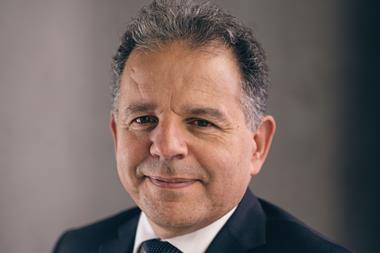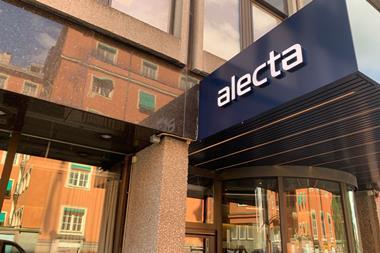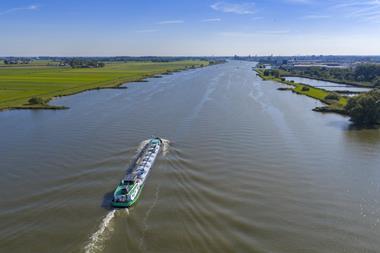Key facts: Alecta
- Total assets: SEK1.31trn (€119bn) (end 2024)
- Swedish pension fund, managing collectively-agreed occupational pensions
- Headquartered in Stockholm
- Chair: Jan-Olov Jacke; CEO: Peder Hasslev; CIO: Pablo Bernengo
- Owned by its private and corporate customers, and works on behalf of the Confederation of Swedish Enterprise (Svenskt Näringsliv) and PTK, which represents 26 trade unions
Recruited nearly two years ago to manage Sweden’s largest pension fund following a series of reputational mishaps, Alecta’s CEO Peder Hasslev has overseen a broadening of the SEK1.31trn (€118bn) institution’s concentrated equities portfolio, as well as governance and risk management improvements.
Speaking with IPE following the occupational pensions giant’s annual results early this month, Hasslev says 2024 was a good year for Alecta.
“We have made significant improvements during the year, mainly within governance, risk management, investment processes and portfolio construction, laying the ground for stronger future results in line with our customers’ high expectations.
“It has taken a lot of blood, sweat and tears, but we are on the right track,” he says.
“The biggest change in terms of our investment strategy since I took up my position as CEO at Alecta is that we have more than doubled the amount of holdings in the equity portfolio – from less than 90 in the beginning of 2023 to almost 200 today, and clearly this is the result of increased focus on portfolio construction and risk management,” he adds.
Losses and failed investments
Following the revelation of huge losses on US niche bank investments two years ago, Alecta’s strategy of maintaining a very concentrated portfolio came in for particular criticism, along with its targeting of foreign stocks.
The failed investments in the US banks, and the problems related to Alecta’s investment in Swedish residential property company Heimstaden Bostad – its largest single investment – made it clear that changes needed to be made, Hasslev says.
Shortcomings were found in its risk management and portfolio construction, and the organisation also needed to be strengthened in certain areas, he notes.
“Although not yet entirely completed, we do see that the hard work from the team is starting to pay off during 2024. [This was] the first whole calendar year with the new team, and we feel that the organisation is boosted,” he says.
“People are more at ease; the new strategy is up and running and we look forward to 2025 being a more ‘normal’ year than the past two have been,” he states.
Hasslev says that within equities management, portfolio construction as well as risk management had to be improved.
“It has taken a lot of blood, sweat and tears, but we are on the right track”
Peder Hasslev, Alecta’s CEO
“Alecta has a very robust and competent team when it comes to understanding and analysing individual companies, so we were on top of the fundamental risks in each investment, but on a aggregated portfolio level there were shortcomings in how to measure, manage and follow up on aggregated portfolio risks,” he says, adding that this has now been addressed.
When it comes to the Heimstaden Bostad investment, the CEO says the organisation had simply not been up to the task. Alecta was too eager to increase investments in the alternative assets space and did not have the structure and competence in place to manage such a strategic shift. This has been amended with new management, new structures and tighter cooperation between different departments,” Hasslev explains.
New CIO, new strategy
The investment strategy has changed since the arrival of Pablo Bernengo as permanent CIO at Alecta in January 2024.
“He has put a new mandate structure in place, streamlined the management of the different asset classes, made some organisational changes and recruited people where we had to strengthen the organisation,” Hasslev adds.
“Pablo Bernengo and I, together with the asset management organisation, have introduced and implemented a 17-point programme with the aim of setting a best practice within the Swedish pension industry when it comes to risk management.
“We initiated parts of the programme in the fall of 2023, shortly after I joined Alecta, and Pablo has been at the helm of implementing many parts of it,” Hasslev says.
Alecta performed a thorough ALM analysis, and based on those results, devised the strategic asset allocation for its portfolio and developed the existing processes for integrating that work into the asset allocation framework, the CEO continues.
“It has resulted in some changes, the most important ones being a reduced strategic equity weight in the DB portfolio,” he said. Both the DB and DC product (Alecta Optimal Porttfolio, AOP) have seen an increased allocation to US equities, as well as to European and Swedish small caps. AOP, accounted for SEK301bn of the provider’s total assets at the end of 2024, compared to the SEK1.01trn of assets under management on the DB side.
Taking risks
The programme of improvement consists of three main areas – risk management, governance and competence, and is broken down into 17 areas, including mandates, limits, reporting and implementation of new risk management systems.
“It also reviews how other functions in the Alecta organisation outside of the asset management work, like, for example, compliance and risk.
“We need to take risks to deliver returns. I think we have managed fairly well given the circumstances, but after two years of turbulence we are now determined to make sure that we work very hard to create an environment steeped in trust and clarity,” Hasslev said, adding that this is essential for an organisation whose primary job is to take risks.
“We have the talented individuals, we have the teams in place, and we are working hard to make sure that these individuals and these teams become an organisation that can leverage all the talent and competence that we have across the firm.
“I believe that we are on the right track, which our employer engagement surveys show, but it is also something that you can feel just walking around the offices,” he adds.
“One can never make guarantees when it comes to investments, but I will say that the risk of the events in 2023 will happen again are severely reduced,” Hasslev says.
Despite the completion of much of its improvement work, Alecta still faces the uncertainty of the two investigations being pursued by the Swedish FSA (Finansinspektion) –one on risk management, and the other on the Heimstaden Bostad investment, which have not yet reached their conclusions.
On Wednesday, the FSA announced it had concluded that another key pensions investor it has been probing regarding its investment in Heimstaden Bostad – the Swedish Pensions Agency – had failed in its control of risk, and issued it with a reprimand.
After steering Alecta this far through its problems, what advice would Hasslev give another institutional investor trying to deal with a crisis of confidence?
“Asset management is more a matter of structured processes than of art. It is my experience, after 30-odd years in the business, that structure beats brilliance. So, focus on the processes,” he says.
And secondly: “This may sound like a cliché, but it is true nonetheless: Transparency is key. Confidence is lost in a second but takes years to build back. Be consistent in being transparent.”
Peder Hasslev bio:
Born 1963
CEO of Alecta from 2023
Previous roles:
2017- 2023: CEO of Saminvest
2017-2023: chair of PFA Pension
2009-2017: deputy CEO, CIO at AMF
2007-2009: head of equities at AMF
2002-2007: head of equities at SEB Asset Management
1998-2002: head of equities at Folksam
Education: MSc in Economics; BA in Political Science
Read the digital edition of IPE’s latest magazine








